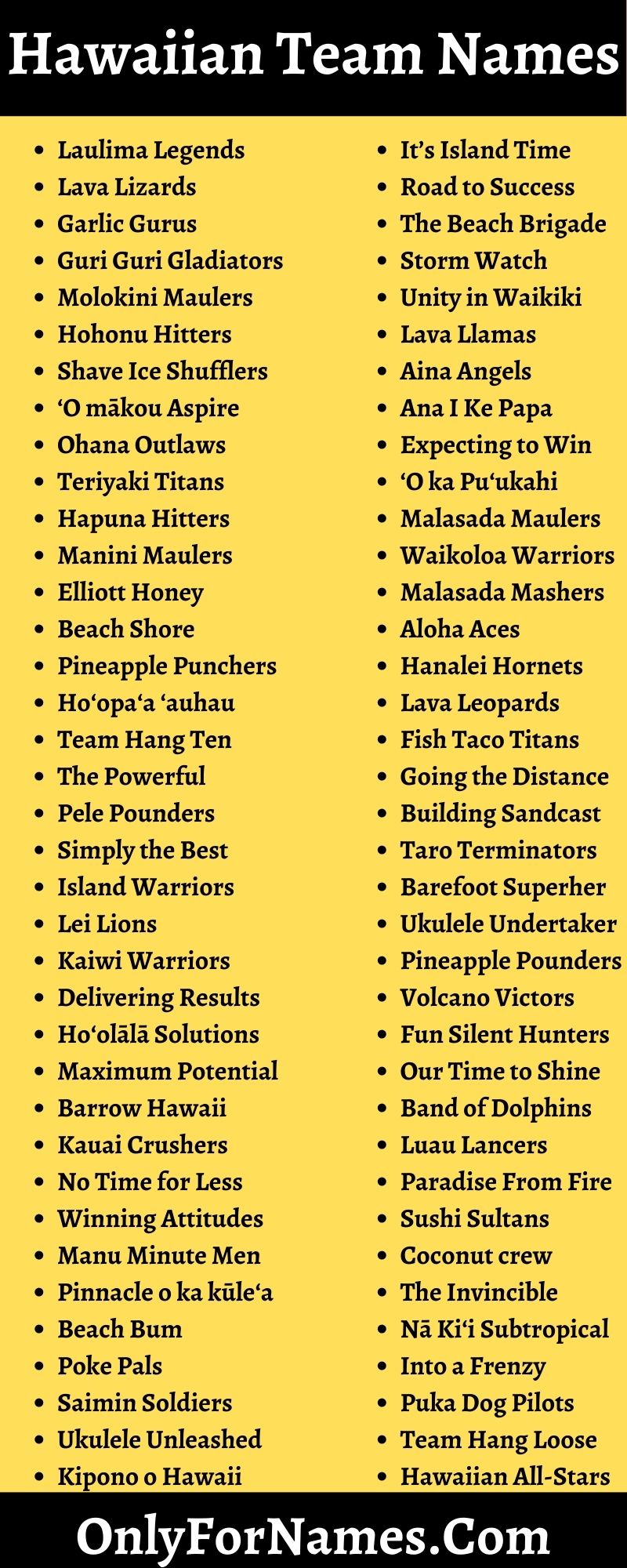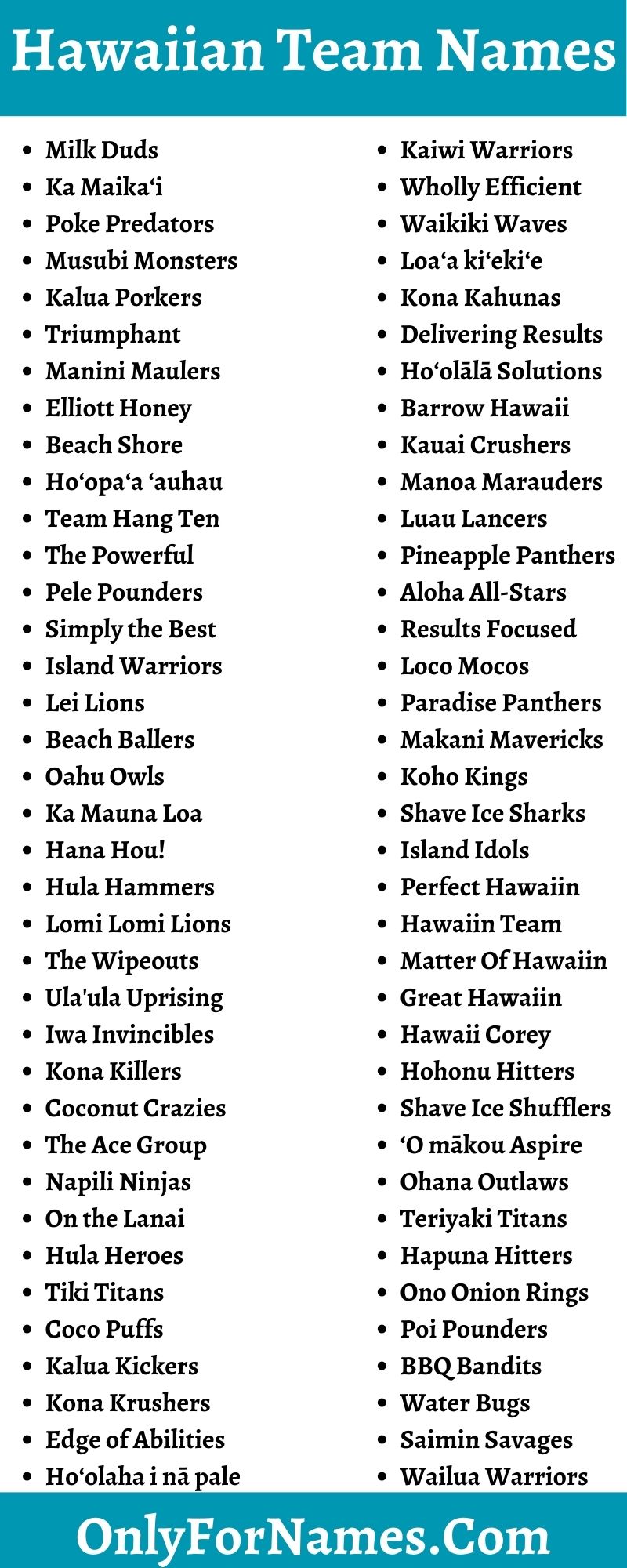Hawaiian Names: A Cultural Journey Through History, Meaning, And Modern Usage
Hawaiian names are an essential part of Hawaii's rich cultural heritage, deeply connected to the islands' history, traditions, and spiritual beliefs. These names carry deep meanings that reflect the values, nature, and identity of the Hawaiian people. If you're interested in learning about Hawaiian names, you've come to the right place.
Hawaiian names have gained popularity worldwide, not only because of their unique sounds but also because of their profound significance. Each name tells a story, whether it's about nature, family, or personal characteristics. This article will take you on a journey through the history, meaning, and modern usage of Hawaiian names.
Whether you're looking for a name for your child, exploring your Hawaiian heritage, or simply fascinated by the beauty of these names, this guide will provide you with comprehensive information. Let's dive into the world of Hawaiian names and discover their beauty and significance.
Read also:Unlocking The Secrets Of Brlivetouchsafranet And Comsafraautonomo Your Ultimate Guide
Table of Contents
- The History of Hawaiian Names
- Cultural Significance of Hawaiian Names
- Meaning Behind Hawaiian Names
- Popular Hawaiian Names Today
- Modern Usage of Hawaiian Names
- Traditional Hawaiian Naming Practices
- Famous Hawaiian Names in Popular Culture
- Tips for Choosing a Hawaiian Name
- Spiritual and Symbolic Elements in Hawaiian Names
- Resources for Learning More About Hawaiian Names
The History of Hawaiian Names
Hawaiian names have a long and fascinating history that dates back thousands of years. Before Western influence, Hawaiian names were deeply connected to the natural world, family lineage, and spiritual beliefs. The Hawaiian language itself is one of the oldest living languages in the world, and its names reflect the rich oral traditions of the islands.
Traditionally, Hawaiian names were not just labels but were considered sacred and powerful. They were often chosen based on significant life events, dreams, or omens. Elders and family members played a crucial role in selecting names, ensuring they carried meaning and relevance to the individual's life.
With the arrival of Western missionaries in the 19th century, Hawaiian names began to change. Many traditional names were replaced with English names, leading to a decline in the use of native Hawaiian names. However, recent decades have seen a resurgence of interest in Hawaiian culture, including the revival of traditional naming practices.
Cultural Significance of Hawaiian Names
Connection to Nature
Hawaiian names often reflect the deep connection between the Hawaiian people and nature. Many names are inspired by elements of the natural world, such as the ocean, mountains, and plants. For example, the name "Kai" means "sea," while "Makana" means "gift" and can refer to the blessings of nature.
Family and Ancestry
Family and ancestry are central to Hawaiian culture, and this is reflected in naming practices. Many Hawaiian names honor ancestors or family members, ensuring that their legacy lives on. Names like "Keanu" (cool breeze) or "Keala" (pathway) often carry familial significance and are passed down through generations.
Spiritual Beliefs
Spirituality plays a vital role in Hawaiian naming traditions. Names are often chosen based on dreams, visions, or spiritual guidance. The belief is that a name can influence a person's destiny and character, making the naming process both meaningful and sacred.
Read also:Gary Desorbo The Unsung Hero Of Modern Entertainment
Meaning Behind Hawaiian Names
Each Hawaiian name carries a specific meaning, often reflecting the values, beliefs, and traditions of the Hawaiian people. Below are some examples of popular Hawaiian names and their meanings:
- Leilani: Heavenly flowers or flowers of royalty.
- Aloha: Love, affection, and peace.
- Kohana: Little gift or small treasure.
- Kamuela: The red earth or the color of the sunset.
- Pono: Righteousness, justice, and balance.
Understanding the meaning behind Hawaiian names can provide insight into the culture and values of the Hawaiian people. These names are not just words but symbols of identity and heritage.
Popular Hawaiian Names Today
Top Male Hawaiian Names
Modern Hawaiian names for boys often combine traditional meanings with contemporary appeal. Here are some popular choices:
- Kai: Sea or ocean.
- Keanu: Cool breeze.
- Kalani: The sky or heavens.
- Kaikea: Calm sea.
- Kamaka: The eye or vision.
Top Female Hawaiian Names
For girls, Hawaiian names often reflect beauty, nature, and grace. Some popular options include:
- Leilani: Heavenly flowers.
- Kealoha: The love.
- Malie: Calm, peaceful.
- Haunani: Beautiful snow.
- Keaka: The shadow or reflection.
These names continue to gain popularity worldwide, thanks to their unique sounds and meaningful connotations.
Modern Usage of Hawaiian Names
In today's globalized world, Hawaiian names have found their way into mainstream culture. Celebrities, musicians, and public figures often choose Hawaiian names for their children, contributing to their growing popularity. According to a 2022 study by the Social Security Administration, names like "Kai" and "Leilani" have consistently ranked among the top names in the United States.
However, it's important to approach Hawaiian names with respect and understanding. While they may sound beautiful, they carry deep cultural significance. If you're considering a Hawaiian name for your child, take the time to learn about its meaning and origins.
Traditional Hawaiian Naming Practices
The Role of Elders
In traditional Hawaiian culture, elders played a crucial role in the naming process. They would consider various factors, such as the child's birth circumstances, dreams, and family history, before choosing a name. This ensured that the name was meaningful and relevant to the child's life.
Use of Nicknames
Hawaiians often use nicknames or shorter versions of names in daily life. For example, "Keanu" might be shortened to "Kai," or "Leilani" might become "Lani." These nicknames are informal but still carry significance and are used with affection.
Multiple Names
It's not uncommon for Hawaiians to have multiple names, including both traditional Hawaiian names and English names. This reflects the blending of cultures and the importance of maintaining cultural identity while adapting to modern life.
Famous Hawaiian Names in Popular Culture
Hawaiian names have made their mark in popular culture, appearing in movies, music, and literature. Some notable examples include:
- Keanu Reeves: The actor's name means "cool breeze over the mountains" in Hawaiian.
- Haunani-Kay Trask: A prominent Hawaiian activist and author whose name means "beautiful snow."
- Leilani Rios: A professional surfer and model whose name means "heavenly flowers."
These individuals have helped bring Hawaiian names into the global spotlight, showcasing their beauty and significance.
Tips for Choosing a Hawaiian Name
If you're considering a Hawaiian name for yourself or your child, here are some tips to help you make an informed decision:
- Research the Meaning: Understand the meaning and significance of the name you're considering.
- Consult Elders or Experts: Seek advice from Hawaiian elders or cultural experts to ensure the name is appropriate and meaningful.
- Consider Pronunciation: Make sure the name is easy to pronounce and won't cause confusion.
- Respect the Culture: Approach Hawaiian names with respect and understanding of their cultural significance.
Choosing a Hawaiian name is a significant decision, so take the time to make it a thoughtful and meaningful one.
Spiritual and Symbolic Elements in Hawaiian Names
Hawaiian names often carry spiritual and symbolic elements that reflect the beliefs and values of the Hawaiian people. For example, names related to nature, such as "Kai" (sea) or "Makana" (gift), symbolize the connection between humans and the natural world. Names like "Pono" (righteousness) emphasize the importance of living a balanced and just life.
These spiritual and symbolic elements make Hawaiian names more than just labels; they are expressions of identity, heritage, and belief. Understanding these elements can deepen your appreciation for Hawaiian culture and its naming traditions.
Resources for Learning More About Hawaiian Names
If you're interested in learning more about Hawaiian names, here are some resources to explore:
- University of Hawaii Press: Offers books and publications on Hawaiian language and culture.
- Hawaiian Dictionary: A comprehensive resource for understanding Hawaiian words and names.
- Hawaiian Cultural Centers: Visit cultural centers in Hawaii to learn more about naming traditions and other aspects of Hawaiian culture.
By exploring these resources, you can gain a deeper understanding of Hawaiian names and their significance.
Conclusion
Hawaiian names are more than just words; they are expressions of identity, culture, and heritage. From their rich history and cultural significance to their modern usage and spiritual elements, Hawaiian names offer a fascinating glimpse into the world of Hawaiian culture. Whether you're looking for a name for your child or simply fascinated by the beauty of these names, this guide has provided you with comprehensive information.
We invite you to share your thoughts and experiences with Hawaiian names in the comments below. If you enjoyed this article, please consider sharing it with others who might find it interesting. For more articles on Hawaiian culture and traditions, explore our website and discover the wonders of this incredible culture.


